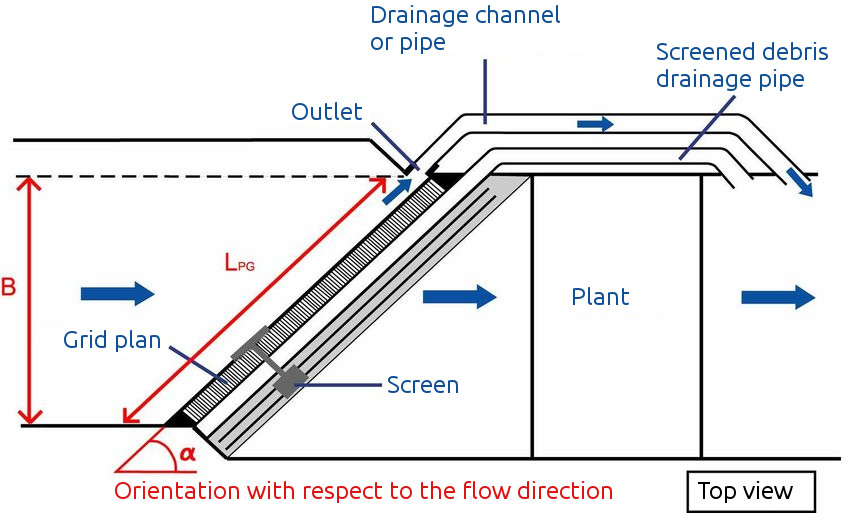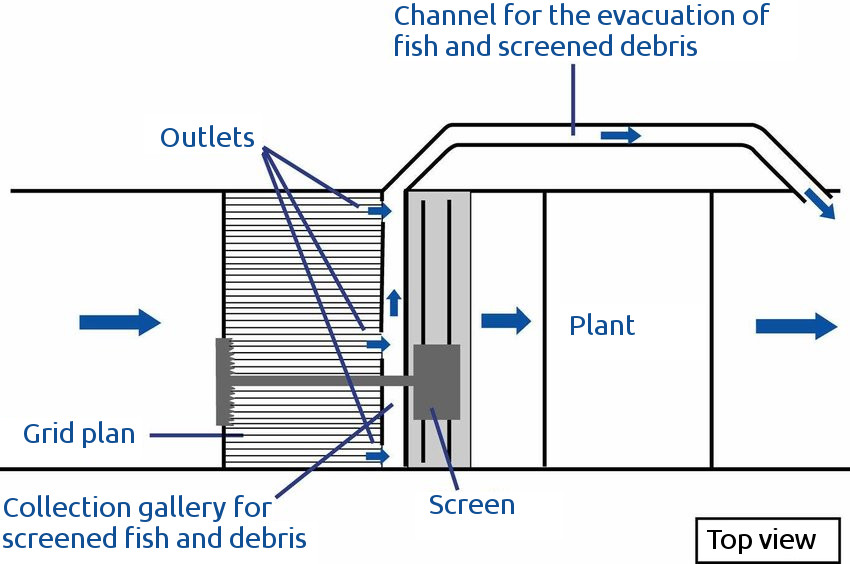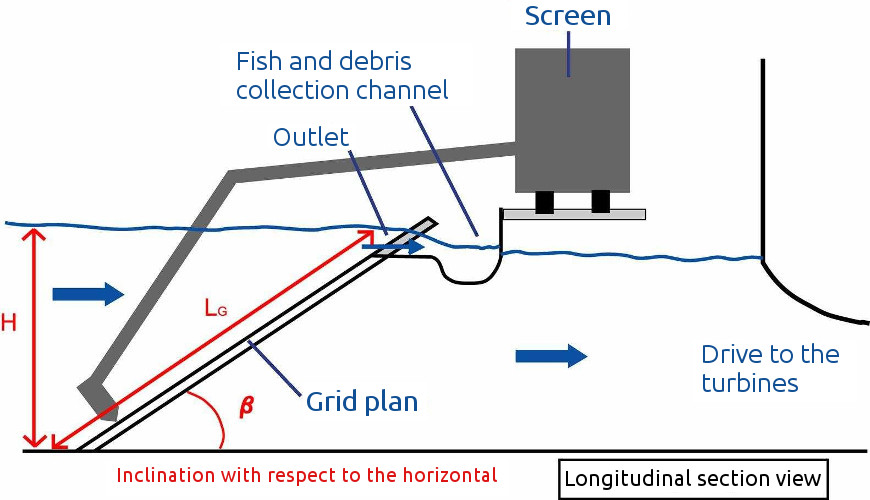Calculation of the head loss on a water intake trashrack
Head loss \(\Delta H\) on a water intake trashrack is calculated as follows:
Upstream flow velocity \(V_1\) is calculated from the discharge \(Q\), the water height \(H_1\) and the intake width \(B\) upstream the trashrack:
The calculation of the head loss coefficient \(\xi\) is based on the characteristics of the trashrack. For a full description of the assumptions, formulas and limitations of the method, please refer to the Raynal et al. (2012) report.
Conventional trashrack
Conventional trashracks: perpendicular to the flow and slightly inclined to the horizontal.
Formula
Use of the F1 formula of Raynal et al (2012) to calculate the head losses.
With:
- \(\xi\): total head loss coefficient (-)
- \(a\): bar shape coefficient (-), see "Bar profile" below
- \(K_O\): blockage head loss coefficient due to bars, spacers and clogging (-)
- \(K_\beta\): head loss coefficient due to the angle of the trashrack (-)
With \(O_C\) blockage ratio due to bars, spacers and clogging (-):
With:
- \(O\) blockage ratio due to bars and spacers
- \(C\) clogging ratio
With \(\beta\) the angle of inclination of the trashrack in reference to the vertical (°).
Angled trashrack
Flow-oriented and near-vertical trashracks.

Courret, D. et Larinier, M. Guide pour la conception de prise d’eau ichtyocompatibles pour les petites centrales hydroélectriques, 2008. https://doi.org/10.13140/RG.2.1.2359.1449.
Formula
Use of the F2 formula of Raynal et al (2012) to calculate the head losses (Also in Equation (7) of Raynal et al. (2013b)).
With \(K_\alpha\) head loss coefficient due to inclination in reference to the horizontal (-)
With:
- \(\alpha\): inclination angle of the trashrack in reference to the horizontal (°)
- \(c\): bar shape coefficient (-), see "Bar profile" below
Inclined trashrack
trashracks perpendicular to the flow, and inclined with respect to the horizontal


Courret, D. et Larinier, M. Guide pour la conception de prise d’eau ichtyocompatibles pour les petites centrales hydroélectriques, 2008. https://doi.org/10.13140/RG.2.1.2359.1449.
Formula
Use of the F3 formula of Raynal et al (2012) to calculate the head losses (Also in Equation (11) of Raynal et al. (2013a)).
With:
- \(K_b\): blockage head loss coefficient due to bars and clogging (-)
- \(K_{Fent}\): spacer shape coefficient (-), see "Bar profile" below
- \(K_{entH}\): blockage head loss coefficient due to spacers (-)
With \(O_{b,C} = O_b + (1 - O_b) \times C\) et \(O_b\) blockage ratio due to bars.
With \(O_{entH}\) blockage ratio due to spacers.
Parameters
Elevation of the immersed vertex of the trashrack
May be different from the water level if the top of the trashrack is drowned.
Section width \(B\)
For conventional or inclined trashrack, it mMust also correspond to the width of the trashrack.
Average approach speed for the maximum turbinated flow, subtracting the upper blocked part, if any
"Maximum" value of the approach speed taken into account in the calculation of the head loss in a safety approach.
Inclination with respect to the horizontal
Conventional trashrack
Scope of the formula: 45 ≤ β ≤ 90°
Angled trashrack
Vertical trashracks (β = 90°).
The slight inclination of the trashracks (β≈ 75/80°), often set up for screening purposes, can be neglected.
inclined trashrack
Scope of the formula: 15° ≤ β ≤ 90°
Recommended for fish guidance: β ≤ 26°
Orientation with respect to the direction of flow
Conventional trashrack
trashracks perpendicular to the flow (α = 90°)
Angled trashrack
Scope of the formula: 30° ≤ α ≤ 90°
Recommended for fish guidance: α ≤ 45°
inclined trashrack
trashracks perpendicular to the flow (α = 90°)
Average normal speed for maximum turbinated flow rate \(V_N\)
Recommended to avoid plating fish on the trashrack (physical barrier) or their premature passage through (behavioural barrier): VN ≤ 0.5 m/s.
Angled or inclined trashrack
Above the average value calculated here, it is essential to refer to the recommendations derived from the experimental characterization of the actual velocity values.
Bar shape ratio \(b/p\)
Angled trashrack
Validity range of the formula: ratio \(b/p\) close to 0.125
Ratio of spacing / bar thickness
Angled trashrack
Scope of validity of the formula: \(1 \leq e / b \leq 3\) with \(e\) space between bars.
Overall obstruction for conventional and angled trashracks
Calculated from bars + spacers + longitudinal and transverse support elements retained, it has to be determined from the trashrack plans.
Scope of validity of the formula for conventional trashracks: \(0.2 \leq O \leq 0.60\)
Scope of validity of the formula for angled trashracks: \(0.35 \leq O \leq 0.60\)
Overall obstruction for inclined trashracks
It consists of two parts.
Obstruction due to the bars and longitudinal support elements retained \(O_b\). To be determined from the trashrack plans.. It must be higher or equal to bar blockage ratio given by \(b / (b + e)\). Scope of validity of the formula: \(0.28 \leq O \leq 0.53\).
Blockage ratio due to spacers. Scope of validity of the formula: \(O_{entH} \leq 0.28\)
Bar profile
Conventional trashrack
The shape coefficient of the bars \(a\) is 2.89 for the rectangular profile (PR) and 1.70 for the hydrodynamic profile (PH).
Angled trashrack
The shape coefficient of the bars is 2.89 for the rectangular profile (PR) and 1.70 for the hydrodynamic profile (PH).
The shape coefficient of the bars \(c\) is 1.69 for the rectangular profile (PR) and 2.78 for the hydrodynamic profile (PH).
inclined trashrack
| Bar shape | Droplet | Plétina | Tadpole 8 | Tadpole 10 | Hydrodynamic | Rectangular |
|---|---|---|---|---|---|---|
 |
 |
 |
 |
 |
 |
|
| Bar coefficient \(A_i\) | 2.47 | 1.75 | 1.27 | 1.79 | 2.10 | 3.85 |
After Lemkecher et al. (2020)
Average shape coefficient of spacers and transverse elements, weighted according to their respective shares
inclined trashrack
To be determined from the trashrack plans.
For example, 1.79 for cylindrical spacers, 2.42 for rectangular spacers, and around 4 for square beams and IPNs.
References
Raynal, S., Courret, D., Chatellier, L., Larinier, M., David, L., 2012. Définition de prises d’eau ichtyocompatibles -Pertes de charge au passage des plans de grille inclinés ou orientés dans des configurations ichtyocompatibles et champs de vitesse à leur approche (POLE RA11.02). https://continuite-ecologique.fr/wp-content/uploads/2019/11/2012_014.pdf
Raynal, S., Courret, D., Chatellier, L., Larinier, M., David, L., 2013a. An experimental study on fish-friendly trashracks–Part 1. Inclined trashracks. Journal of Hydraulic Research 51, 56–66. https://doi.org/10.1080/00221686.2012.753647
Raynal, S., Chatellier, L., Courret, D., Larinier, M., David, L., 2013b. An experimental study on fish-friendly trashracks–Part 2. Angled trashracks. Journal of Hydraulic Research 51, 67–75. https://doi.org/10.1080/00221686.2012.753646
Lemkecher, F., Chatellier, L., Courret, D., David, L., 2020. Contribution of Different Elements of Inclined Trash Racks to Head Losses Modeling. Water 12, 966. https://doi.org/10.3390/w12040966